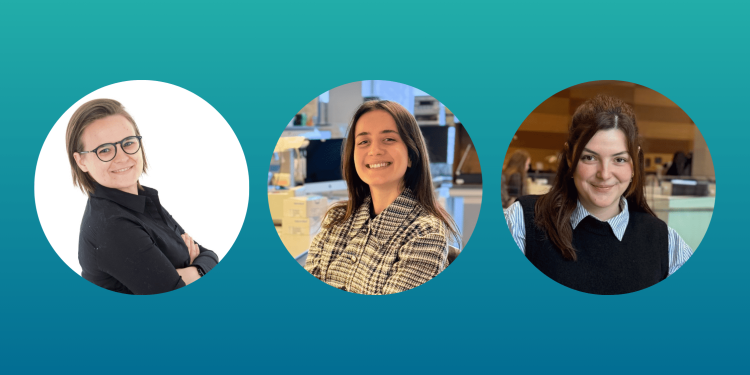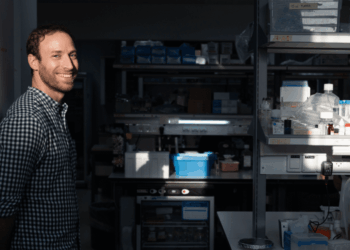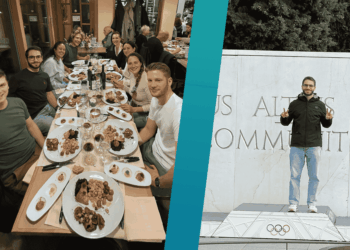 Julie Mazet, Christina Metoikidou, and Martha Zarou have been selected as the inaugural recipients of the prestigious EACR-Mark Foundation Postdoctoral Fellowship.
Julie Mazet, Christina Metoikidou, and Martha Zarou have been selected as the inaugural recipients of the prestigious EACR-Mark Foundation Postdoctoral Fellowship.
This highly competitive fellowship, established through a partnership between the European Association for Cancer Research (EACR) and The Mark Foundation for Cancer Research, provides outstanding early-career scientists with three years of funding to advance groundbreaking cancer research in leading laboratories across Europe. Designed to support promising postdoctoral researchers at a critical stage in their careers, the fellowship aims to foster innovation, encourage international collaboration, and accelerate progress in cancer research by enabling talented scientists to pursue ambitious and high-impact projects.
“Investing in the next generation of scientists is crucial to securing the future of cancer research,” says Ryan Schoenfeld PhD, CEO of The Mark Foundation. “We are proud to partner with the EACR in supporting these talented early-career investigators.”
Jane Smith, CEO of the EACR, says, “We are grateful to The Mark Foundation for its support for EACR members and their important work to drive progress against cancer. We look forward to these projects getting underway very soon!”
 About Julie Mazet
About Julie Mazet
Dr. Julie M. Mazet is a postdoctoral research fellow specialising in cancer immunology in Prof. Johanna Joyce’s lab at the University of Lausanne, Switzerland. She obtained her PhD in Molecular and Cellular Medicine from the University of Oxford, UK, in 2023, where her research focused on the role of interferon-gamma (IFNγ) in CD8+ T cells during antitumor responses. She uncovered an IFNγ-driven negative feedback loop that restricts the maintenance of stem-like CD8+ T cells within melanoma tumours, ultimately limiting antitumor potential. This work provided new insights into key complex mechanisms governing immune cell dynamics in the tumour microenvironment.
Dr. Mazet has been recognised with several awards, including the Kennedy Trust Prize Studentship, the British Society of Immunology Congress Travel Grant, and prizes for the best talk and poster presentation during different symposiums. In her postdoc at the Ludwig Cancer Research Lausanne Branch, she focuses her research on understanding the (dys)function of CD8+ T cells in brain metastasis. By leveraging her expertise in CD8+ T cell biology and the extensive resources and outstanding environment in Prof. Joyce’s lab, she aims to uncover the mechanisms underlying the limited CD8+ T cell response in brain metastases.
With the support of the EACR-Mark Foundation Postdoctoral Fellowship, she hopes to contribute to the development of novel strategies to enhance immune responses against metastatic cancer.
“I am truly honoured to receive this fellowship from the EACR and The Mark Foundation,” Julie says. “I look forward to improving our knowledge of CD8+ T cells in brain metastasis to advance cancer immunotherapy. Every experiment is a step closer to understanding how we can outsmart cancer.”
Connect with Julie on LinkedIn and Bluesky.
 About Christina Metoikidou
About Christina Metoikidou
Christina is a postdoctoral researcher in Daniela Thommen’s lab at the Netherlands Cancer Institute and the Oncode Institute. Originally from Greece, she obtained her bachelor’s degree in biology from Aristotle University of Thessaloniki. She then moved to France to pursue a master’s degree at the University of Paris, where she undertook research internships focusing on anti-tumour immune responses, deepening her understanding of cancer immunology.
She completed her PhD in the Immunity and Cancer department at Institut Curie in Paris, where her research focused on CD8 T cell differentiation toward exhaustion in human cancer. Using a combination of experimental techniques and bioinformatic approaches, she characterised distinct intratumoral CD8 T cell states and investigated their association with therapy responses and their spatial organisation within tumours.
Currently, as a postdoctoral researcher, she is studying the underlying mechanisms driving these distinct CD8 T cell states in the tumour microenvironment (TME). Her research explores how different precursor origins shape the functional, metabolic, and phenotypic profiles of these cells. By identifying local TME signals, such as cytokines or metabolites, that influence these states and assessing their reinvigoration potential in response to immunotherapy, she aims to uncover new strategies to enhance anti-tumour immune responses.
“I am deeply honoured to receive this postdoctoral fellowship from EACR and The Mark Foundation,” Christina says. “This fellowship will allow me to explore how local tumour microenvironment signals shape distinct CD8 T cell states, with the ultimate goal of developing novel strategies to boost immune responses in cancer.”
Connect with Christina on LinkedIn and Bluesky.
 About Martha Zarou
About Martha Zarou
Martha is a postdoctoral research fellow in Karen Vousden’s laboratory at the Francis Crick Institute, where she is seeking to understand the role of mitochondrial folate-mediated one-carbon metabolism in the early stages of pancreatic development. She developed an interest in mitochondrial one-carbon metabolism during her PhD in the labs of Vignir Helgason and Alexei Vazquez at the University of Glasgow. There, she uncovered how the loss of mitochondrial folate pathway leads to the differentiation of slow-cycling leukemic stem cells. Following completion of her PhD, she accepted a one-year post-doc position in the Helgason lab to build on generated data and investigate how leukaemia exposure alters macrophage function in the bone marrow microenvironment.
Her current research is focused on how modulation of folate metabolism in pancreatic and innate immune cells alters the response to pancreas damage and pancreatic cancer development, with the persistence of these responses being key in differentiating healing from malignant progression. She is using in vitro and in vivo models combined with multiomic technologies and molecular biology techniques, including single nucleus RNA sequencing, metabolomics and immunophenotyping. She believes that understanding the role of mitochondrial one-carbon metabolism will provide mechanistic insight into critical factors that distinguish damage resolution from persistence and may identify metabolic vulnerabilities at the early stages of cancer development.
“I am very grateful to have been awarded the prestigious EACR-Mark Foundation fellowship,” Martha says. “This fellowship will greatly support my work on investigating metabolic vulnerabilities during early pancreatic cancer development.”
Connect with Martha on LinkedIn and Bluesky.
EACR Postdoctoral Fellowships
To find out more about the EACR’s other Postdoctoral Fellowships, click here.



 Julie Mazet, Christina Metoikidou, and Martha Zarou have been selected as the inaugural recipients of the prestigious EACR-Mark Foundation Postdoctoral Fellowship.
Julie Mazet, Christina Metoikidou, and Martha Zarou have been selected as the inaugural recipients of the prestigious EACR-Mark Foundation Postdoctoral Fellowship. About Julie Mazet
About Julie Mazet About Christina Metoikidou
About Christina Metoikidou About Martha Zarou
About Martha Zarou





